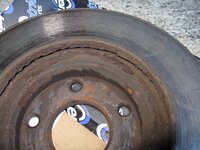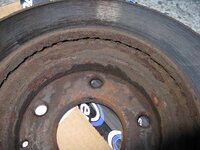I changed my front rotors and brake pads yesterday, and they were a real PITA!! Both were rusted onto the hubs. Took about a half hour on the passenger side to get it off and a good 45 minutes on the other side, probably because they were on for 61k miles and were exposed the winter salt and brime. I never had front brakes last that long. If you're planning to do this yourself, you might want to get a screw that fits the screw hole in the face of the rotor because in the end that's what got it off and a lot of penetrating oil. Replaced them with Centric rotors and went with OEM pads because they worked great, were very low dust, and lasted so long, still had about 3/32 left on the lowest pad. The pictures are of the inside of the drivers side rotor, the one that took the longest. Never had a rotor rusted away like that on the inside.
One other problem is the bleeder screws. I tend to crack them open before I collapse the piston back into the housing so as not to force old brake fluid back through the ABS unit so as not to set off an error code with the ABS unit as has happened to me in the past. Now they're seeping a little and I have to retorque them once in a while because they seem to work themselves loose. Maximum torque is 86 in/lbs. Time will tell on this.


One other problem is the bleeder screws. I tend to crack them open before I collapse the piston back into the housing so as not to force old brake fluid back through the ABS unit so as not to set off an error code with the ABS unit as has happened to me in the past. Now they're seeping a little and I have to retorque them once in a while because they seem to work themselves loose. Maximum torque is 86 in/lbs. Time will tell on this.


Last edited:
